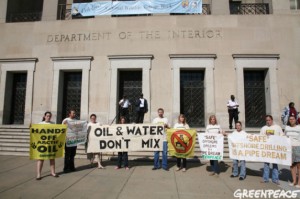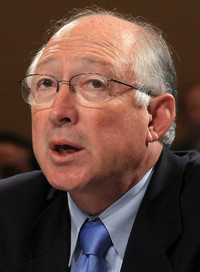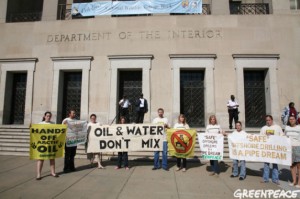The following video originally aired April 20th on GRITtv. In it, Shannon Biggs & Maude Barlow speak about recognizing the Rights of Nature:
—
The following video originally aired April 20th on GRITtv. In it, Shannon Biggs & Maude Barlow speak about recognizing the Rights of Nature:
—
It is speculators and Big Oil — not a lack of oil and gas supply in today’s market — driving high oil and gasoline prices.
Listen to my interview today on WBEZ’s (Chicago NPR) Worldview radio program to learn more about rising oil and gasoline prices, turmoil in the Middle East, speculators, Big Oil, and offshore oil drilling.
Please take a listen and share the interview with others!
 The following article by Global Exchange and Code Pink Co-founder Medea Benjamin also appeared on AlterNet.org.
The following article by Global Exchange and Code Pink Co-founder Medea Benjamin also appeared on AlterNet.org.
—
As long as people keep organizing and mobilizing, there will be victories to celebrate.
This year was marked by turmoil at home and abroad, including a deepening financial crisis that continues to leave millions jobless and homeless, as well as ongoing and expanding wars. But despite the setbacks and disappointments, here is a list of victories to be thankful for, starting with three inspirational women.
1. On November 13, Nobel Peace Prize winner Aung San Suu Kyi was released from house arrest. In 1990 her party, the National League for Democracy, won the elections but the military junta refused to let them take power. Instead, Suu Kyi was kept under house arrest for almost 15 of the last 21 years. Her release brings great joy and hope to millions of people in Burma and supporters of democracy worldwide.
2. Dilma Rousseff was elected president of Brazil and takes power on January 1. Dubbed by the media “the most powerful woman in the world,” Rousseff was tortured and jailed for three years for opposing Brazil’s military dictatorship. She later became Chief of Staff for the popular outgoing president and former metalworker, Lula da Silva, whose policies of growth with equity have helped pull millions of Brazilians out of poverty. While some worry about Rousseff’s commitment to the environment (she was also Lula’s Energy Minister), the fact that a progressive woman from the Labor Party will rule a powerhouse like Brazil is cause for celebration.
3. Elizabeth Warren became “consumer czar.” After the financial meltdown in 2008, Warren was appointed Chairwoman of the five-member Congressional Oversight Panel created to investigate the banking bailout and oversee TARP. She won tremendous public support by sharply criticizing the banks and calling for greater transparency and accountability. Warren advocated for a Consumer Financial Protection Bureau to protect borrowers from abuses in mortgages, credit cards and other consumer loans. On September 17 President Obama named her special adviser by to oversee the development of this new bureau.
4. The Nobel Peace Prize was awarded to Chinese literary critic and professor Liu Xiaobo. Liu, a critic of China’s one party state, was sentenced to 11 years in prison for drafting a petition calling for free speech and open elections. The Chinese government usually escapes rebuke for its oppressive practices because the country is such an economic superpower. However, according to Amnesty International, some 500,000 Chinese prisoners are in detention without charge or trial. Harassment, surveillance, house arrest, and imprisonment of human rights defenders are on the rise, as is Internet and media censorship, and repression continues for Falun Gong practitioners and minority groups, including Tibetans, Uighurs and Mongolians. The Nobel Prize for Liu Xiaobo has helped expose China’s dirty secrets.
5. Speaking of exposing secrets, WikiLeaks has sent shock waves around the world by exposing the inner machinations of U.S. foreign policy. After a decade of illegal wars, lack of accountability, government secrecy and embedded journalists, WikiLeaks has given the public a much-needed look at the way the U.S. government continues–under President Obama–to cajole, bribe and strong arm other nations into supporting U.S. policies. We look forward to more revelations in 2011 and we hope more people will step forward to defend WikiLeaks and suspected whistleblower Bradley Manning!
6. Don’t Ask Don’t Tell was repealed. The LGBT community has been fighting to repeal Don’t Ask Don’t Tell since it was first introduced as a compromise measure by President Clinton in 1993. In an historic Senate vote on December 18 the policy was repealed and then signed by President Obama on December 22. While some find it hard to celebrate the ability of more people to now fight in U.S. wars, let’s remember that this victory will help the gay community win upcoming, more important struggles for marriage rights and equality in the workplace.
7. U.S. troop levels in Iraq declined dramatically. While President Obama has presided over a disastrous surge of troops in Afghanistan, he does seem to be holding to his promise of ending the U.S. military presence in Iraq. The number of U.S. troops has declined from some 144,000 in January 2009 to roughly 50,000 today. The remaining troops are supposed to leave the country by the end of 2011, and many worry they will be replaced by private contractors. The U.S. invasion of Iraq, based on lies and resulting in the death and displacement of millions of Iraqis, is one of the most shameful episodes in our history. The sooner it ends, the better.
8. The health care bill passed. No, it was not a single payer bill and it didn’t even have a public option, disappointing many of its original supporters. But the bill does extend health coverage to over 30 million Americans who would have otherwise been uninsured; it stops private insurance companies from rejecting people for preexisting conditions; and it allows children to remain covered by their parents’ insurance until the age of 26. Taken as a whole, it represents a progressive shift in U.S. social policy, which is why it is being so viciously attacked by the right. And from the left, the fight for a single payer system, especially on the state level, is far from over!
9. The Senate ratified the New Strategic Arms Reduction Treaty (START) between the U.S. and Russia. The New START provides modest reductions in the number of deployed strategic nuclear weapons, and includes monitoring and verification procedures. Unfortunately, to get Republican support the U.S. commitment to disarmament is countered by a new commitment to spend $180 billion over 10 years to “modernize” U.S. weapons and delivery systems. But not passing the treaty would have been disastrous. The new treaty will undoubtedly improve U.S.-Russia relations and will hopefully move us closer to the eventual elimination of nuclear weapons.
10. In a little noticed automobile obituary, the last Hummer rolled off the production line on May 24–a casualty of higher gas prices, the economic crunch and a shift in consumer preferences. The cool cars of today are no longer monstrous gas guzzlers but hybrid and electric cars. There are 28 hybrid models already on the market today. At least 12 plug-in electric cars are planned for 2011, kicking off a wave of new green vehicles.
And a few extras for good cheer:
11. At the White House Tribal Nations Conference on December 15, President Obama announced that the United States would support the UN Declaration on the Rights of Indigenous Peoples. The statement is significant because the United States was one of only four countries that voted against the declaration when the UN General Assembly adopted it in 2007, and the last of those four to have reversed its former opposition.
12. In a policy reversal after the BP oil disaster, the Obama administration announced that it will not allow offshore oil drilling in the eastern Gulf of Mexico or off the Atlantic coast for at least seven more years. Meanwhile, offshore wind power is taking off from Maine to Georgia.
13. Foreign private security contractors were banned by the governments of Iraq and Afghanistan, and Blackwater founder Eric Prince–hounded by lawsuits and bad press–felt compelled to sell the company and move out of the country.
14. Thanks to California’s Proposition 19, also known as the Regulate, Control & Tax Cannabis Act, the debate on failed Marijuana Prohibition has arrived! Despite not passing, 4 million people voted to control and tax marijuana, with endorsements coming from new allies from the SEIU to the NAACP to law enforcement groups.
15. The government-supported student loan program was dramatically restructured, eliminating private banks and thereby ensuring that more money goes directly into the hands of low-income students.
I could keep the list going. It’s an important reminder, as we go into what will be a very difficult new year, that people on all continents continue to struggle for a more peaceful, just, sustainable world. And as long as people keep organizing and mobilizing, there will be victories to celebrate.
It’s official; the White House announced earlier today that the moratorium on deep water drilling which was not set to expire until November 30th is now being lifted. The announcement was made by Interior Secretary Ken Salazar during a conference call with reporters Tuesday afternoon. Salazar explained:
“We have made and continue to make significant progress in reducing the risks associated with deepwater drilling” and therefore, “I have decided that it is now appropriate to lift the suspension on deepwater drilling for those operators that are able to clear the higher bar that we have set.”
Global Exchange is deeply disappointed by this decision to prematurely lift the ban. Antonia Juhasz, Global Exchange Energy Program Director, explained in a recent article:
IT SHOULD BE BLATANTLY CLEAR at this stage of the Deepwater Horizon tragedy that we are witnessing the failure of an entire system, rather than of one operator. Systemic solutions are therefore required. One obvious first step is a permanent moratorium on all offshore drilling—a model of energy extraction which the industry is unable to safely perform and the government is unable to adequately regulate.
Upon hearing the news about the drilling ban being lifted, Antonia had this to say (while in Alabama via phone, researching for her new book on the Gulf oil disaster🙂
One very positive step of the Obama administration was putting in place a deeply needed moratorium on deep water drilling, but it seems that election year politics have led to a quid pro quo in which the administration implemented extremely limited regulations on offshore drilling in exchange for an early lifting of the moratorium.
Environmental groups have been quick to respond to today’s announcement. 
Sierra Club issued a press release on their website stating “The BP disaster was a wake up call, but our leaders keep hitting the snooze button.” Greenpeace included a link to “Tell Congress: No New Drilling. Period” along with photos of their protest today.
The moratorium on deep water drilling was originally imposed on May 27th before a revised ban was enacted on July 12th and set to expire November 30th.
If you’re concerned about the ramifications of this early ban lifting, here are a few ways to take action and make your voice heard:
Tell Congress No New Drilling: Visit Greenpeace for an easy-to-fill-out form.
Call or email the White House: White House phone #s and email are here and here.

Interior Secretary Ken Salazar. Photographer: Mark Wilson/Getty Images
The following post is cross-listed on the Chevron Program blog:
It’s official; the White House announced earlier today that the moratorium on deep water drilling which was not set to expire until November 30th is now being lifted. The announcement was made by Interior Secretary Ken Salazar during a conference call with reporters Tuesday afternoon. Salazar explained:
“We have made and continue to make significant progress in reducing the risks associated with deepwater drilling” and therefore, “I have decided that it is now appropriate to lift the suspension on deepwater drilling for those operators that are able to clear the higher bar that we have set.”
Global Exchange is deeply disappointed by this decision to prematurely lift the ban. Antonia Juhasz, Global Exchange Energy Program Director, explained in a recent article:
IT SHOULD BE BLATANTLY CLEAR at this stage of the Deepwater Horizon tragedy that we are witnessing the failure of an entire system, rather than of one operator. Systemic solutions are therefore required. One obvious first step is a permanent moratorium on all offshore drilling—a model of energy extraction which the industry is unable to safely perform and the government is unable to adequately regulate.
Upon hearing the news about the drilling ban being lifted, Antonia had this to say (while in Alabama via phone, researching for her new book on the Gulf oil disaster:)
One very positive step of the Obama administration was putting in place a deeply needed moratorium on deep water drilling, but it seems that election year politics have lead to a quid pro quo in which the administration implemented extremely limited regulations on offshore drilling in exchange for an early lifting of the moratorium.
Environmental groups have been quick to respond to today’s announcement. 
Sierra Club issued a press release on their website stating “The BP disaster was a wake up call, but our leaders keep hitting the snooze button.” Greenpeace included a link to “Tell Congress: Now New Drilling. Period” along with photos of their protest today.
The moratorium on deep water drilling was originally imposed on May 27th before a revised ban was enacted on July 12th and set to expire November 30th.
If you’re concerned about the ramifications of this early ban lifting, here are a few ways to take action and make your voice heard:
Tell Congress No New Drilling: Visit Greenpeace for an easy-to-fill-out form.
Call or email the White House: White House phone #s and email are here.
This article originally appeared in the August 2010 issue of Progressive Magazine, The Big Spill.
IT SHOULD BE BLATANTLY CLEAR at this stage of the Deepwater Horizon tragedy that we are witnessing the failure of an entire system, rather than of one operator. Systemic solutions are therefore required. One obvious first step is a permanent moratorium on all offshore drilling—a model of energy extraction which the industry is unable to safely perform and the government is unable to adequately regulate.
In the last five years alone, there have been, just in the Gulf of Mexico, 400 offshore safety and environmental incidents, including blowouts and other major accidents, according to a Houston Chronicle analysis. BP is the leader with forty-seven violations, Chevron is second at forty-six, and Shell is third at twenty-two.
Among the unifying features of these incidents is the failure of the U.S. Minerals Management Service to act. The MMS failed to travel to one-third of the accident scenes, collected only sixteen fines out of 400 incidents, and did not investigate every blowout, as their own rules require.
Transocean, the company that owned and operated the Deepwater Horizon drilling rig, is another common thread. Transocean is the largest deep-water driller in the Gulf of Mexico, operating nearly half of all the rigs in the Gulf that work in more than 3,000 feet of water. It is the company of choice for industry leaders, including Chevron and Exxon, even though, according to a recent Wall Street Journal analysis, nearly three of every four incidents that triggered federal investigations into safety and other problems on deepwater drilling rigs in the Gulf since 2008 have been on rigs operated by Transocean.
The companies also all use the same grossly negligent subcontractor, the Response Group, to write their disaster “preparedness” plans for their Gulf operations. On June 15, Congressman Ed Markey, chair of the House Subcommittee on Energy and the Environment, revealed that all five of the major oil producers in the Gulf of Mexico—BP, Chevron, Exxon, ConocoPhillips, and Shell—used the virtually identical, tragically inadequate disaster plan on how they would handle a spill at their Gulf operations.
The plan, required by the MMS prior to approval for drilling, includes glaring errors and omissions that “vastly understate the dangers posed by an uncontrolled leak and vastly overstate the company’s preparedness to deal with one,” reports AP.
Three of the companies’ 2009 plans, including BP’s, listed as a consultant biologist Peter Lutz, who died in February 2005. Four ensured that their plans addressed the need to protect walruses, sea lions, and seals, although none of these live in the Gulf, revealing that the reports were not only cut and pasted between the companies, but also likely originally written for Arctic operations. Most importantly, the plans absolutely do not work, as BP’s response to the Deepwater Horizon explosion has made horrifically clear. Nonetheless, each and every plan received the government’s approval.
Perhaps more disturbing, however, is Markey’s response: token recommendations for lifting the liability cap on oil spills, requiring that oil companies pay more in royalties, implementing new safety reforms, and developing new technologies for capping wells.
In 1981, a federal moratorium on all new offshore drilling off the Atlantic and Pacific coasts and parts of Alaska was implemented. It was a direct response to the 1969 Unocal offshore oil rig blowout that released three million gallons of oil into the Santa Barbara Channel of California.
BP’s Deepwater Horizon tragedy is far worse, and far from an isolated incident. All around the world, every day, offshore rigs leak and spill. They far too often kill workers, release deadly toxins, produce methane, pollute the air and water, and destroy fisheries and livelihoods.
The oil industry has chosen to blatantly and disdainfully thumb its nose at the government’s regulatory authority, while the government has chosen to be an all-too-willing rubber stamp, demonstrating that it has neither the capability nor the will to regulate this industry. As it was in 1981, a moratorium is the only logical response.
Another key moment in U.S. oil history offers further solutions: the 1911 breakup of Standard Oil. The oil giant became too large for the government to regulate. In response to a massive people’s movement that built from the most local levels and reached the Supreme Court, Standard was broken into thirty-four separate corporate parts. Ultimately, the final step will come when we have retired the oil industry altogether once and for all.
Antonia Juhasz, author of “The Tyranny of Oil: The World’s Most Powerful Industry—and What We Must Do to Stop It” (HarperCollins 2008), is working on a book on the BP disaster. She is a director at Global Exchange, a San Francisco-based human rights organi- zation (www.TyrannyofOil.org,www.GlobalExchange. org/chevron).